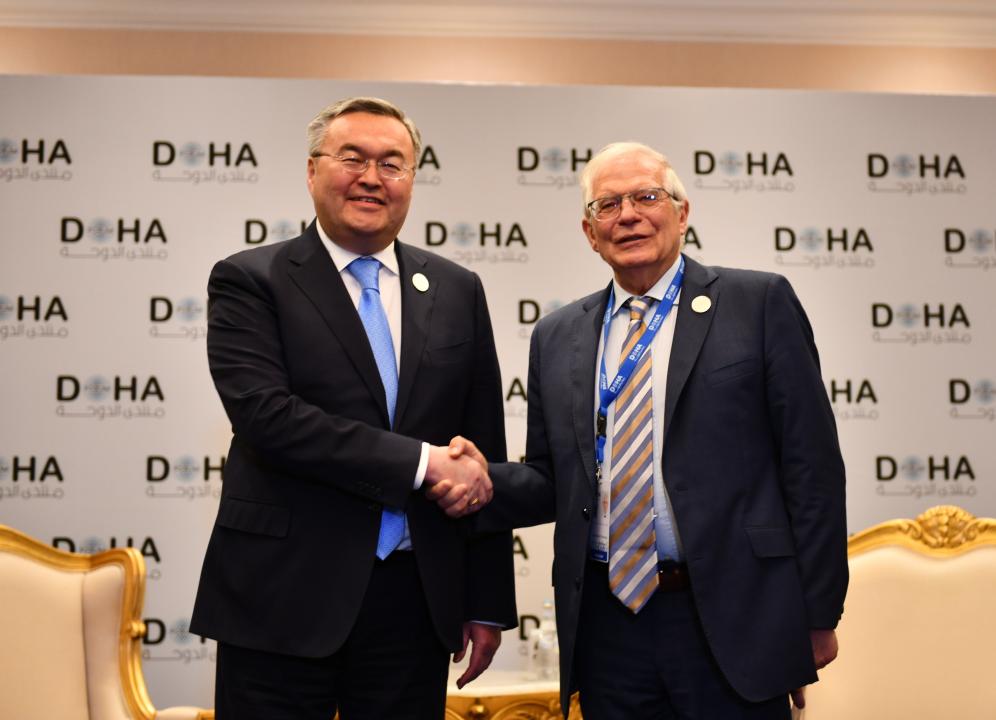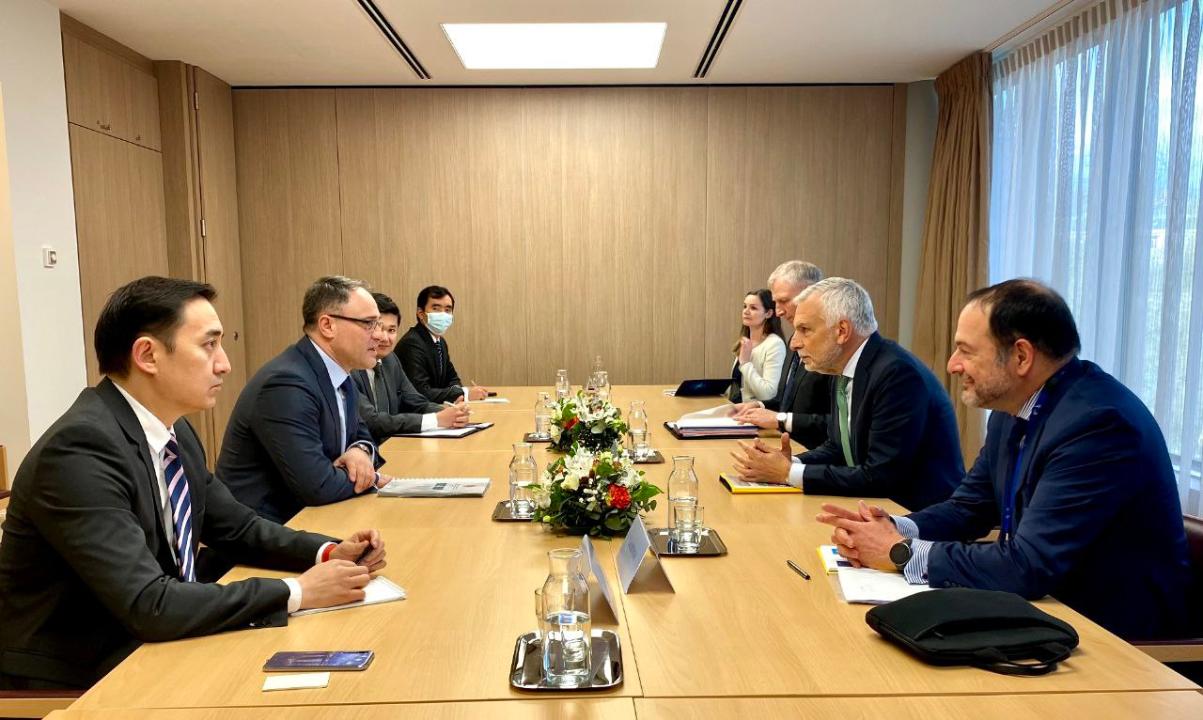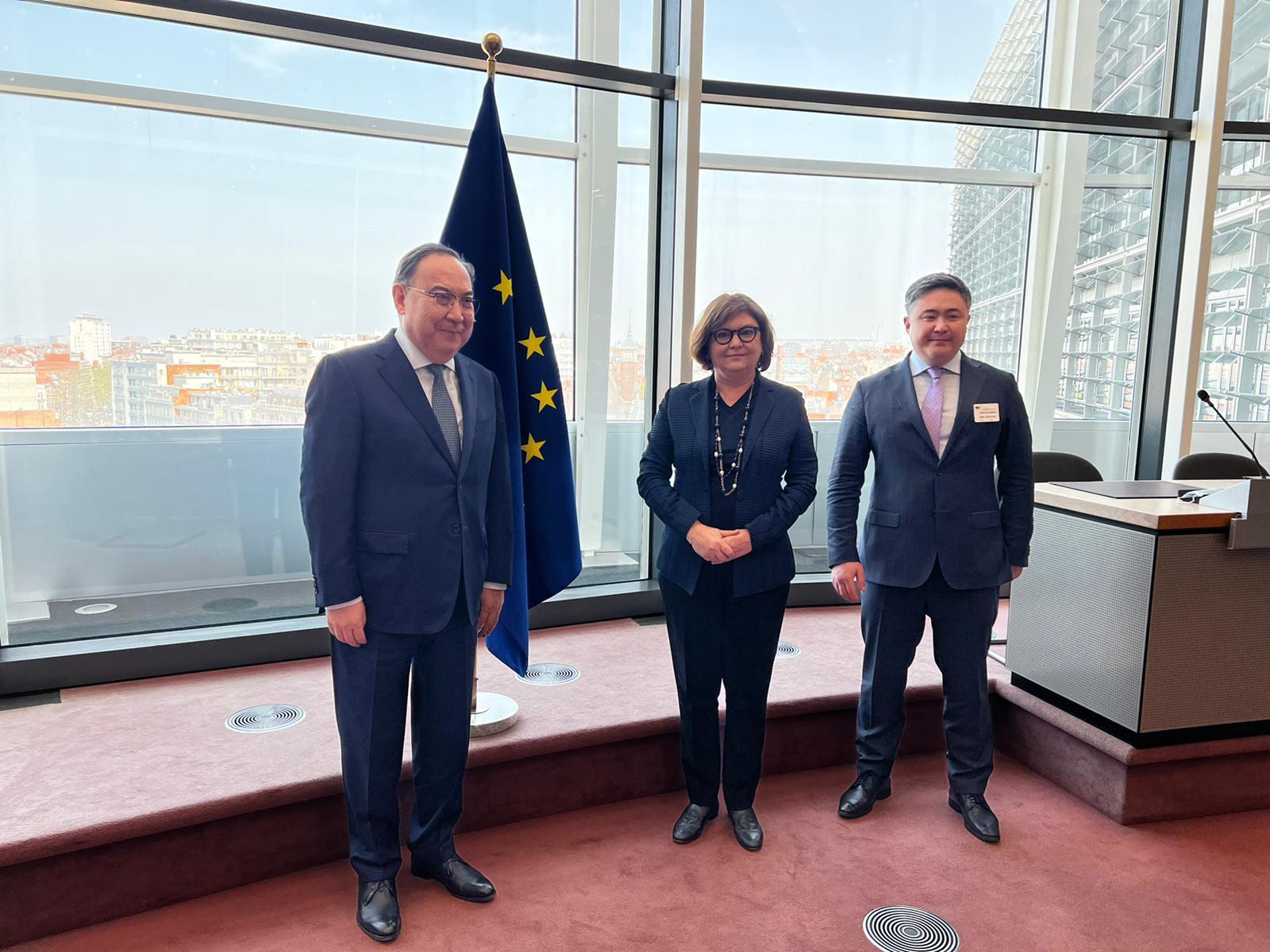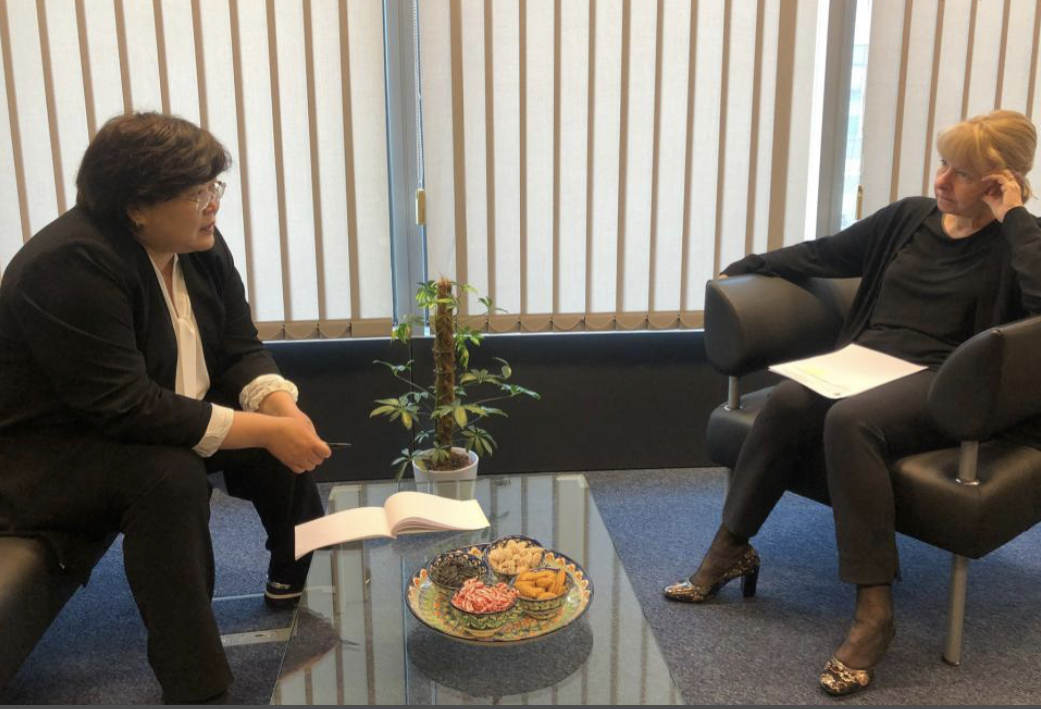NUR-SULTAN – Top Kazakh and European Union (EU) officials held a number of meetings in Brussels, Nur-Sultan and elsewhere over the past week with the sides reaffirming readiness to maintain and expand their partnership across the board. The significance of the talks was hightened by the geopolitical tensions between the West and Russia over the conflict in Ukraine which have a spillover effect on Kazakhstan and other countries in Central Asia.

Tileuberdi and Borrell shake hands for a group photo. Photo credit: Kazakh Foreign Ministry
First, Deputy Prime Minister – Minister of Foreign Affairs Mukhtar Tileuberdi and EU High Representative for Foreign Affairs and Security Policy – Vice-President of the European Commission Josep Borrell met March 26 on the sidelines of the annual Doha Forum. The two discussed priority areas of cooperation in the short and medium-term under the Enhanced Partnership and Cooperation Agreement (EPCA) between Kazakhstan and the EU that went into full force in March 2020. It covers 29 areas of cooperation from trade to public procurement to human rights.
During the meeting, Tileuberdi spoke about the reforms undertaken by President Kassym-Jomart Tokayev to build a New Kazakhstan with a strong civil society as well as the concept of the Second Republic aimed at modernizing the model of public administration. According to the Kazakhstan foreign ministry, Borrell expressed strong support for sweeping political reforms in Kazakhstan and readiness to assist in advancing cooperation between Kazakhstan and the EU in all spheres of mutual interest.
Tileuberdi and Borrell also focused on the joint efforts to address the situation in Ukraine and the impact of Western sanctions against Russia on the economy of Kazakhstan. They considered further opportunities to diversify areas of cooperation, in particular, transit routes. Tileuberdi assured Borrell of Kazakhstan’s readiness to contribute to the diplomatic resolution of the situation through mediation, as well as to continue providing humanitarian aid to those affected.
A few days later, in Brussels, Deputy Foreign Minister Roman Vassilenko also spoke about domestic reforms and further ways to enhance the partnership between Kazakhstan and the EU.

Deputy Foreign Minister Vassilenko during his meeting with European counterparts. Photo credit: Kazakh Foreign Ministry
“Our President has decided to respond to this shocking event (referring to tragic January events) by doubling down on reforms, vowing to build a New Kazakhstan, meaning that a more resilient, more open and diversified economy offers opportunities for all, not a privileged few. New Kazakhstan means a more fair society that provides opportunities for most disadvantaged groups to share the wealth of the country, and, of course, a more agile political system,” Vassilenko told a EURACTIV Debate in Brussels on March 30.
At this event, as well as the regular session of the Cooperation Committee with the European Union, e spoke in detail about the reforms initiated by Tokayev during his March 16 state-of-the-nation address, all with a goal to have a “more competitive political system.”
The reforms have also been on the agenda of Vassilenko’s meetings in The Hague on April 1, where the top Dutch foreign ministry officials expressed their support and readiness to assist in the ongoing reforms, also emphasizing the importance of respect for human rights and freedom of speech.
Heads of EU diplomatic missions in Kazakhstan were also informed of the ongoing reforms during their March 30 meeting with the Secretary of State of Kazakhstan Erlan Karin in Nur-Sultan. He focused on explaining the mechanisms of transition from the super-presidential system of governance to the model of a presidential republic with a strong parliament, among other major initiatives from the presidential address.
Western sanctions on Russia
While describing the goals of their own visit to Brussels on March 28-29, Timur Suleimenov, the first deputy chief of staff to the president, said he and Erzhan Kazykhan, deputy chief of staff to the president and his special envoy for international coopeartion, sought to show the European partners that Kazakhstan is keen to expand the cooperation with the EU and the West generally despite the Western sanctions on Russia.

From L to R: Kazykhan, European Commissioner for Transport Adina-Ioana Vălean and Suleimonov. Photo credit: Akorda press service
“The main reason is our own will to come here, to our main trading partner and one of our key investment partners, to discuss the situation openly and say that yes, we will continue trading with Russia,” Suleimenov said in an interview with Brussels-based EURACTIV agency.
He said Kazakhstan will continue to invest in Russia and attract investment from Russia, because “there is no way for our economy to do it differently.”
He emphasized that Kazakhstan seeks to expand cooperation with the EU countries and the EU as a whole.
Speaking about domestic reforms, he went on to say the January events “served as an important impetus, as a trigger for much-needed reforms and changes in Kazakhstan’s economy, society, in our political system.”
“The President took it upon himself recently in his speech in the parliament and address to the nation. He announced further reforms in the political system that will require amendments in the constitution and the liberalization of the political field. We are empowering local powers and local governments, and more,” said Suleimenov.
Visiting Brussels, Suleimenov and Kazykhan held high-level discussions with Valdis Dombrovskis, Executive Vice-President and Commissioner for Trade, Adina Valean, the European Commissioner for Transport, and Janusz Wojciechowski, the European Commissioner for Agriculture, as well as the leadership of the EU Directorate-General for Energy and the Directorate-General for Financial Stability, Financial Services and Capital Markets Union (FISMA).
According to the Akorda press service, European officials expressed interest in the political and economic reforms of President Tokayev and welcomed his recently proposed initiatives. They said they are ready to support the country in its implementation through various EU instruments in the field of sustainable development and the rule of law.
Cooperation in human rights
On March 29, Elvira Azimova, Kazakhstan’s Commissioner for Human Rights, completed her own two-day visit to Brussels, where she held meetings with high-level representatives of the European External Action Service (EEAS) and the European Parliament (EP).

Kazakhstan’s Commissioner for Human Rights Elvira Azimova (L) and Special Representative of the European Union for Central Asia Terhi Hakala.
During the meeting with Special Representative of the European Union for Central Asia Terhi Hakala, she discussed the support by the European institutions of Kazakhstan’s initiatives and projects aimed at improving the judicial and penal systems of Kazakhstan, including through the Human Rights Dialogue, the Sub-Committee on Justice and Rule of Law, as well as the Central Asia – EU Civil Society Forum.
During talks with Fulvio Martusciello, chairman of the EP delegation to the EU-Kazakhstan parliamentary cooperation committee (DCAS), the sides discussed details of the upcoming visit of the European Parliament delegation to Nur-Sultan to participate in the 19th meeting of the Kazakhstan – EU Parliamentary Cooperation Committee in early April.
Trade and investment
Trade and investment were also an important part of the meetings’ agenda as the EU is Kazakhstan’s largest trading partner and investor.
The first two months demonstrated positive dynamics: trade grew 70 percent reaching US$6 billion compared to the same period in 2021.
Exports from Kazakhstan to the EU in January and February increased by 84.4 percent and made $5.2 billion, driven by an increase in supplies of crude oil, ferroalloys, unprocessed aluminum, wheat, oil products, and natural gas.
At the same time, imports to Kazakhstan from the EU increased by 14 percent and reached $767.5 million. Kazakhstan largely imports medicines, packaged for retail sale, vaccines, turbojet, turboprop engines, air or vacuum pumps, compressors and fans, computing machines, fittings for pipelines, telephone sets, and ferrous metal products.

